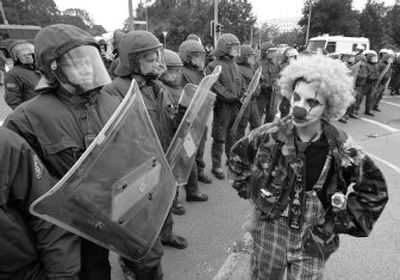Protests erupt near site of G-8 summit

ROSTOCK, Germany – Hundreds of protesters clashed anew with security forces Monday ahead of this week’s Group of Eight summit in Heiligendamm, and police said they briefly halted a demonstration in a nearby city and were pelted with stones.
About 800 protesters demonstrated outside Rostock’s immigration office demanding “global freedom of movement and equal rights for all,” including refugees and asylum seekers. After a peaceful start, the demonstration turned violent and “some protesters started to throw bottles at officers,” police spokesman Lyder Behrens said.
Later Monday, Behrens said police interrupted a march by about 8,500 demonstrators through downtown Rostock, the scene of weekend clashes in which hundreds were injured.
“As a reaction, they then started to throw … stones at us,” Behrens said. Police said the situation was swiftly brought under control and the march continued, and 49 people were arrested.
Rostock, about 15 miles from Heiligendamm, was the scene Saturday of the biggest protest so far against the G-8 summit. Authorities said more than 400 officers were injured as hooded protesters pelted police with rocks and bottles, 30 of whom were hospitalized with broken bones and cuts.
Organizers said 520 demonstrators were hurt, 20 of them seriously.
The three-day meeting begins Wednesday, when German Chancellor Angela Merkel will host the leaders of Britain, France, Japan, Italy, Russia, Canada and the U.S. for discussions on issues including global warming, aid to Africa and the world economy. President Bush left Monday for the summit, with his first stop in Prague, in the Czech Republic.
Germany is determined to avoid a repeat of the debilitating violence that has marred previous G-8 summits, notably in Genoa, Italy, in 2001, where one protester was killed. It has reinforced its border controls ahead of the summit.
Activists have complained that security surrounding the three-day summit is excessive.
An administrative court in the town of Greifswald ruled that only 50 protesters will be allowed to hold a rally directly outside Rostock’s airport, where Bush and other leaders are scheduled to arrive late today.
Activists had sought permission for a 1,500-member demonstration at the airport, but the court rejected their claim for security reasons.
The approved protest will be restricted to a shoulder of a road across from the airport entrance. A bigger group will be allowed to protest at a nearby parking area for buses.
Separately, Germany’s Federal Constitutional Court said an alliance of activist groups had challenged a lower court’s ban on protests outside of Heiligendamm.
That ban came into force last week, when public access to Heiligendamm was shut off. Authorities had said earlier that starting Wednesday, the demonstration ban will be expanded to about 3 1/2 miles beyond a 7 1/2 -mile fence that was built around Heiligendamm.
It was not clear when the court would rule on the case.